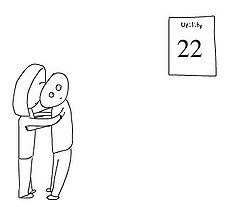
The Schizophrenia of Modern Ethical Theories
Encyclopedia

Ethics
Ethics, also known as moral philosophy, is a branch of philosophy that addresses questions about morality—that is, concepts such as good and evil, right and wrong, virtue and vice, justice and crime, etc.Major branches of ethics include:...
by Michael Stocker. The central claim of the paper is that some modern ethical theories fail to account for motive
Motivation
Motivation is the driving force by which humans achieve their goals. Motivation is said to be intrinsic or extrinsic. The term is generally used for humans but it can also be used to describe the causes for animal behavior as well. This article refers to human motivation...
in their theories, producing a sort of schizophrenia because the agent is unable to use his reasons or motives as a basis for his actions. According to Stocker, motive is important to ethics and should be considered as well, rather than only “duty, rightness and obligation” which he believes are the main focuses of current theories. Stocker believes that this focus is not compatible with the motives required for goods such as love
Love
Love is an emotion of strong affection and personal attachment. In philosophical context, love is a virtue representing all of human kindness, compassion, and affection. Love is central to many religions, as in the Christian phrase, "God is love" or Agape in the Canonical gospels...
and friendship
Friendship
Friendship is a form of interpersonal relationship generally considered to be closer than association, although there is a range of degrees of intimacy in both friendships and associations. Friendship and association are often thought of as spanning across the same continuum...
.
Stocker uses the example of a friend visiting you in the hospital. It is nice at first, however he reveals that he chose to spend time with you not out of concern for you in particular, but because he felt it was his moral duty
Duty
Duty is a term that conveys a sense of moral commitment to someone or something. The moral commitment is the sort that results in action and it is not a matter of passive feeling or mere recognition...
. In this case, we feel that there is something missing in this action—we would much prefer to be visited by someone who cares about us directly, not just his duty.
John Stuart Mill
John Stuart Mill
John Stuart Mill was a British philosopher, economist and civil servant. An influential contributor to social theory, political theory, and political economy, his conception of liberty justified the freedom of the individual in opposition to unlimited state control. He was a proponent of...
, in the second chapter of Utilitarianism
Utilitarianism (book)
John Stuart Mill's book Utilitarianism is a philosophical defense of utilitarianism in ethics. The essay first appeared as a series of three articles published in Fraser's Magazine in 1861; the articles were collected and reprinted as a single book in 1863...
, says, “[...] utilitarian moralists have gone beyond almost all others in affirming that the motive has nothing to do with the morality of the action,”
See also
- Immanuel KantImmanuel KantImmanuel Kant was a German philosopher from Königsberg , researching, lecturing and writing on philosophy and anthropology at the end of the 18th Century Enlightenment....
- Deontological ethicsDeontological ethicsDeontological ethics or deontology is the normative ethical position that judges the morality of an action based on the action's adherence to a rule or rules. It is sometimes described as "duty" or "obligation" or "rule" -based ethics, because rules "bind you to your duty"...

